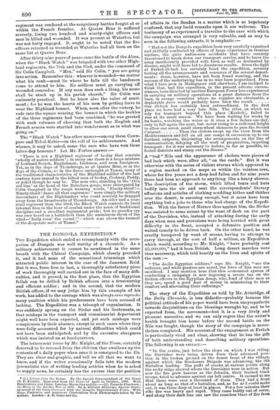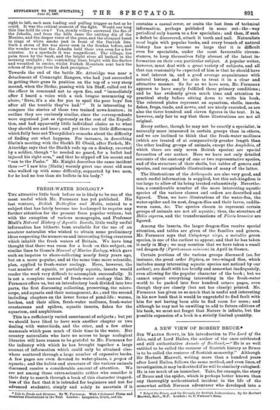THE DONGOLA. EXPEDITION.*
THE Expedition which ended so triumphantly with the occu- pation of Dongola was well worthy of a chronicle. As a military achievement it cannot be mentioned in the same breath with the Chitral Campaign, which closely preceded it, and it had none of the sensational trimmings which attracted public interest in the case of the Jameson Raid. But it was, from first to last, a thoroughly satisfactory piece of work thoroughly well carried out in the face of many diffi- culties, and it proved, in the first place, that the Egyptian fellah can be drilled by British officers into a trustworthy and efficient soldier ; and in the second, that the modern British officer, if we may judge him by this example of his work, has added to the courage which was always sans reproche many qualities which his predecessors have been accused of lacking. The Expedition was a triumph of organisation. It was suddenly sprung on the Sirdar and his lieutenants, so that mishaps in the transport and commissariat department might well have been expected, and yet such mishaps were conspicuous by their absence, except in such cases where they were fully accounted for by natural difficulties which could not have been anticipated, and by the excessive cheapness which was insisted on at headquarters.
The letters sent home by Mr. Knight, of the Times, certainly deserved to be rescued from the oblivion that swallows up the contents of a daily paper when once it is consigned to the file. They are clear and graphic, and tell us all that we want to know, and if the writer occasionally falls into the modern journalistic vice of writing leading articles when he is asked to supply news, he certainly has the excuse that the position
• (I.) Letters from the Sudan. By the Special Correspondent of the Times (E. F. Knight). Reprinted from the Times of April to October, 1898. With Illustrations and Plans. London : Macmillan and Co.—(2.) Towards Khartoum : the Story of the Soudan War of 1898. By A. Hilliard Atteridge, Special Corre- spondent of the Daily Chroeicte with the Dongola Expeditionary Force. With Maps, Portraits, and numerous Illustrations from Photographs taken by the Author. London, A. D. lanes and Co.
of affairs in the Soudan is a matter which is so hopelessly confused, that any lucid remarks upon it are welcome. The testimony of so experienced a traveller to the care with which the campaign was arranged is very valuable, and as may be seen in the following extracts, it is emphatic :—
" Had not the Dongola expedition been very carefully organised and skilfully conducted by officers of large experience in frontier warfare, the quite unforeseen accidents that have recently threatened to break down our transport service, and to leave the army insufficiently provided with food, as well as decimated by disease, might well have led to disastrous results. Since the fight at Ferkeh ill-luck has certainly beset the expedition, severely testing all the arrangements and resources of the several depart- ments; these, however, have not been found wanting, and the success of the undertaking has in no wise been jeopardised. From what I have seen in Madagascar and elsewhere. I am inclined to think that, had this expedition, in the present adverse circum-
stances, been directed by another European Power less experienced in carrying on military operations at a great distance from the base, in savage countries where no supplies are obtainable, a
deplorable fiasco would probably have been the result Our ill-luck has certainly been extraordinary. In the first place we have had a very late Nile. The river, on which we rely for transport beyond this place [Kosheli], failed to rise at its usual season. We have been waiting for weeks by
Its banks, watching the water as it rises a few inches one day, only to fall again the next, but never rising to a sufficient height to allow our seven small stern-wheel steamers to pass the Second Cataract Then the cholera swept up the river from the Mediterranean and fell on all our camps in succession up to our furthest outposts, disjointing the arrangements on the line of communication, delaying all the work of preparation, impeding transport : for it was necessary to isolate, as far as possible, in- fected districts and stamp out the disease."
A " bad " Nile and the appearance of cholera were pieces of bad luck which were, after all, "on the cards." But it was otherwise with the series of violent storms which appeared in a region marked on the maps as within the rainless area, where for five years not a drop had fallen and for nine years there had been no approach to anything like a heavy shower. The description of the storm, which lifted tents and huts bodily into the air and sent the correspondents' literary effusions and articles of clothing scudding hither and thither over the desert, is amusing enough, but it must have been anything but a joke to those who had charge of the Expedi- tion. With the forces of Nature thus against him, the Sirdar was assisted to some extent by the want of dash on the part of the Dervishes, who, instead of attacking during the early days when men and provisions were being hurried with great difficulty to the front, accepted a defensive position and waited tamely to be driven back. On the other hand, he was cruelly hampered by want of means, having to attempt to carry through, at the cost of half a million, an Expedition which would, according to Mr. Knight, "have probably cost £5,000,000," had it been British. Long desert marches were thus necessary, which told heavily on the lives and spirits of the men :—
" The docile Egyptian soldiers," says Mr. Knight, "are the sufferers, and while piastres are saved, the lives of fine men are sacrificed. I may mention here that this economical system of conducting a campaign is now imposing a severe tax on the British officers in the Egyptian Army, who, fond of their men as they are, spend a good deal of money in ministering to their comfort and alleviating their sufferings.'
The story of the Expedition as told by Mr. Att,eridge, of the Daily Chronicle, is lees didactic—probably because the political attitude of his paper would have been unsympathetic towards disquisitions on the blessings wrought by, and to be expected from, the movement—but it is a very lively and pleasant narrative, and we can only regret that the writer's health brought him home before the second battle on the Nile was fought, though the story of the campaign is never- theless completed. His account of the engagement at Ferkeh is particularly vivid and clear, showing that he has the gift of both understanding and describing military operations.
The following is an extract :—
" In the centre, just below the slope on which I was riding, the Dervishes were being driven from their advanced posi- tion in the broken ground on the desert front of the village, against which the Soudanese Brigade was advancing, the 9th Battalion leading. The puffs of smoke at various points along the rocky ridge showed where the Dervishes were in action. But now the fire grew heavier as the Jehadia, their trained black troops, tried to advance against our left centre. It seemed to me that there were over a thousand of them. They had a front about as long as that of a battalion, and, as far as I could make out, it was three deep at least in places. For a few minutes their rifle fire was heavy and rapid. They came boldly out of cover, and along their dark line one saw the ceaseless blaze of fire from right to left, each man loading and pulling trigger as fast as he could. It was the critical moment of the fight. Would our long thin line hold its own P Yea, steady volleys answered the fire of the Jehaclia, and from the hills came the rattling din of the Maxims, and the deeper voice of the guns, and the shrapnel burst in rings of white smoke just in front of the Dervish line. Such a storm of fire was never seen in the Soudan before, and the wonder was that the Jehadia held their own even for a few minutes. As a spectacle it was magnificent. The village, the palm trees by the bank, and the bright river all bathed in the morning sunlight ; the contending lines, bright with fire-flashes and wreathed in smoke, whilst Ferkeh Mountain sent back the echoes of the guns from its dark precipices."
Towards the end of the battle Mr. Atteridge was near a detachment of Connaught Rangers, who had just succeeded in getting their guns in position on the top of a very steep mound, when the Sirdar, passing with his Staff, called out to the officer in command not to open fire, and "immediately after I heard a voice with a rich brogue murmuring up above, Sure, it's a sin for you to spoil the poor boys' fun after all the trouble they've had.'" It is interesting to compare the stories of these two trained news-hunters; in outline they are curiously similar, since the correspondents were organised just as rigorously as the rest of the Expedi- tion, and had apparently little individual choice as to what they should see and hear ; and yet there are little differences which fully bear out Thucydides's remarks about the difficulty of finding out what happens. For instance, in describing Slatin's meeting with the Sheikh El Obeid, after Ferkeh, Mr. Atteridge says that the Sheikh rode up on a donkey, escorted by a soldier, though "he needed no guard, for a bullet had injured his right arm," and that he slipped off his mount and "ran to the Pasha." Mr. Knight describes the same incident thus :—" I saw him [Slatin] warmly greet one stout old man who walked up with some difficulty, supported by two men, for he had no less than six bullets in his body."



















































 Previous page
Previous page